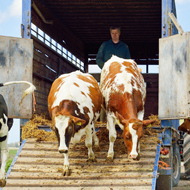
New system welcomed by farmers
Farming minister George Eustice has announced plans to simplify the rules for moving livestock. The new regime will be introduced in July this year and phased in over a 12 month period.
Under the current system, farmers must report livestock movements to any other land they own or rent within a five mile radius. This triggers an automatic six-day lockdown, or 'standstill', during which time no animals can be moved.
There are a raft of different rules for sheep, cattle and pigs, which fall under a complex web of schemes.
According to Defra, the new scheme hopes to simplify the rules, cut red tape and reduce the burden of form filling. It will allow farmers to move animals around any land they have registered within a 10 mile radius - without the need for reporting or standstills. The reporting and lockdown requirements will still apply for movements to other farms or businesses.
The new system for registering land will be run jointly by the Animal and Plant Health Agency (APHA) and Rural Payments Agency (RPA).
APHA's veterinary director Simon Hall said the changes will also help with disease prevention by providing better livestock location data.
Mr Eustice added: "When a disease outbreak occurs, knowing where animals have been is fundamental to containing and eliminating it."
The changes have been welcomed by the National Farmers Union. Chairman of the livestock board, Charles Sercombe, commented: "We believe they have the potential to simplify the holding registration and livestock movement regime which has been a burden on the livestock industry for many years.
"Many of our members have indicated that this is a positive step and should clarify how they manage their businesses on a daily basis, without any loss of traceability and disease control measures."
Livestock farmers will receive guidance about the new system from next month.



 The veterinary mental health charity Vetlife is inviting the veterinary community to join it for a sponsored cold-water dip.
The veterinary mental health charity Vetlife is inviting the veterinary community to join it for a sponsored cold-water dip.